Units 1-4 单元复习 课件(共36张PPT) 2023-2024学年牛津深圳版英语七年级上册
文档属性
| 名称 | Units 1-4 单元复习 课件(共36张PPT) 2023-2024学年牛津深圳版英语七年级上册 | 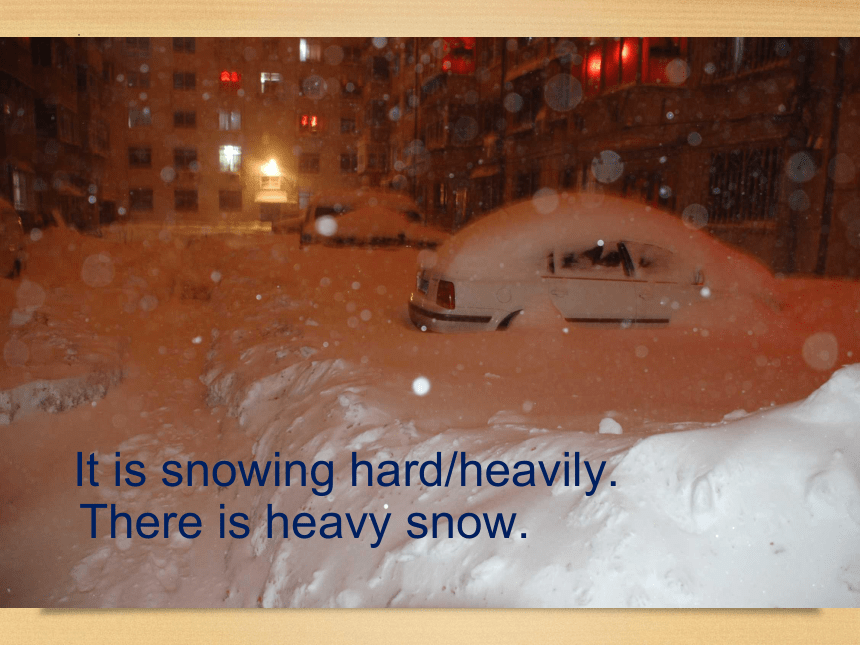 | |
| 格式 | pptx | ||
| 文件大小 | 1.2MB | ||
| 资源类型 | 教案 | ||
| 版本资源 | 牛津深圳版 | ||
| 科目 | 英语 | ||
| 更新时间 | 2023-10-24 20:49:15 | ||
图片预览

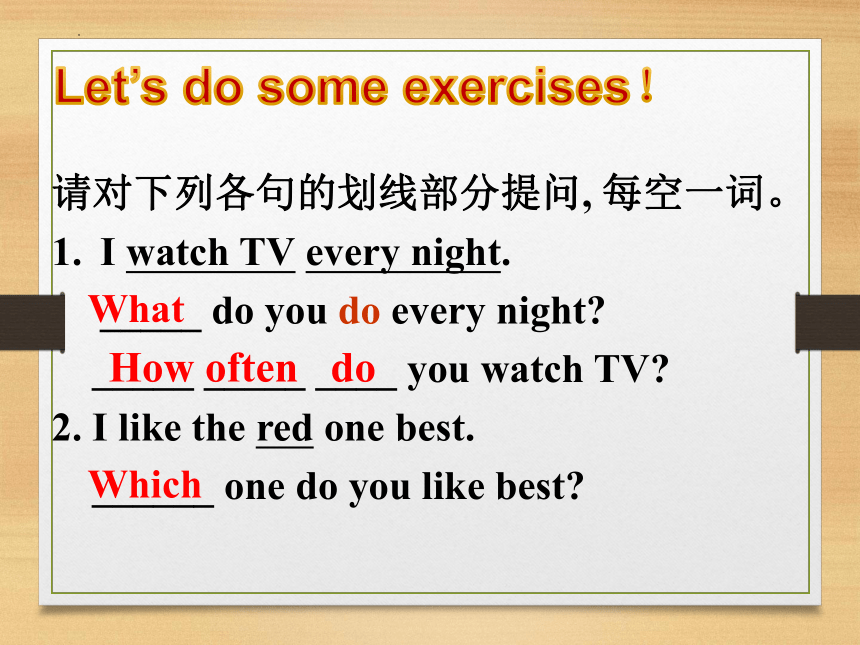
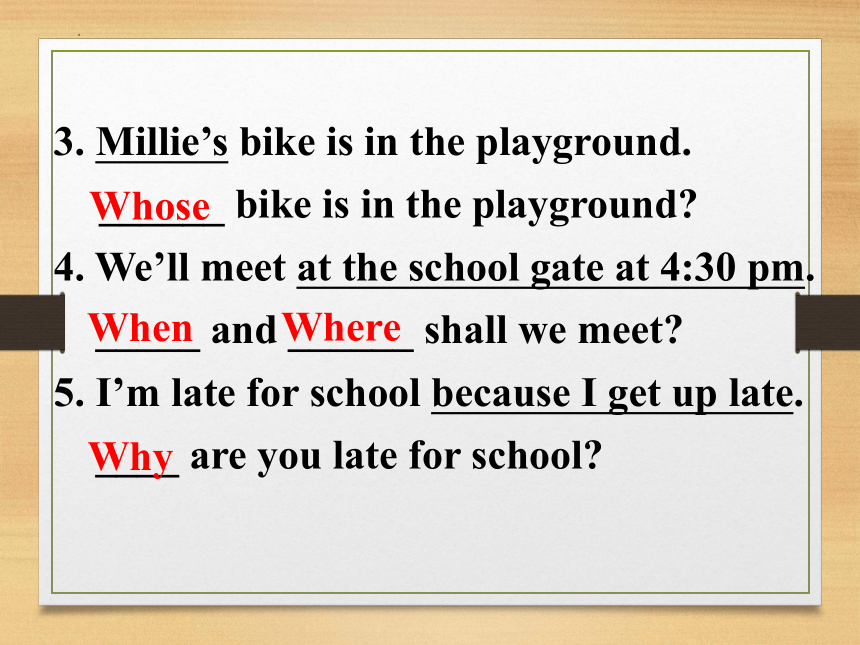

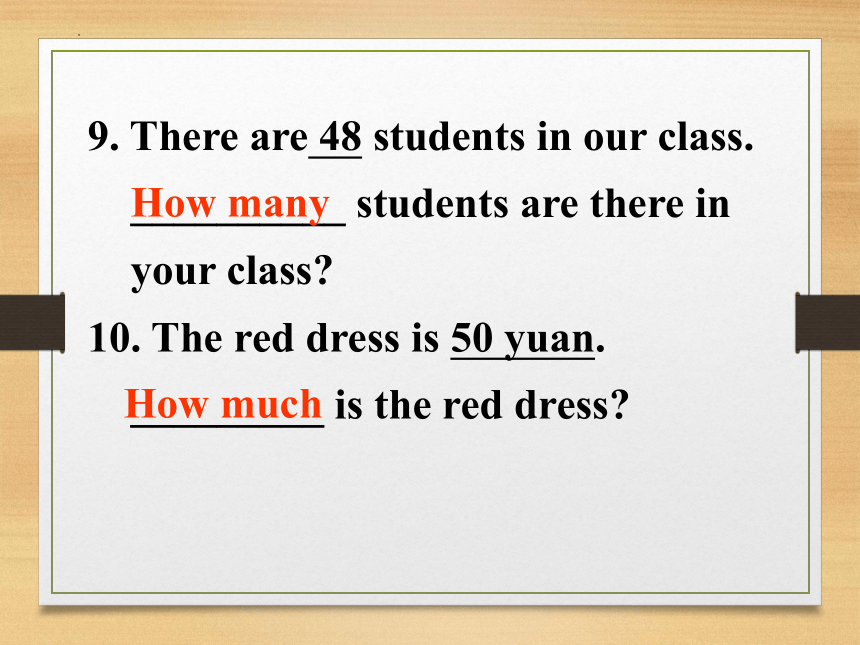

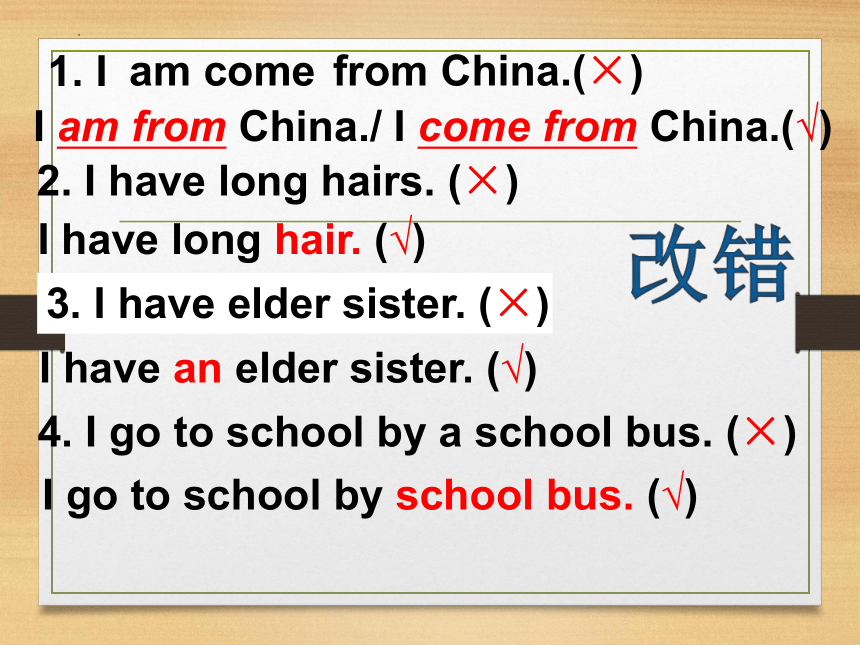
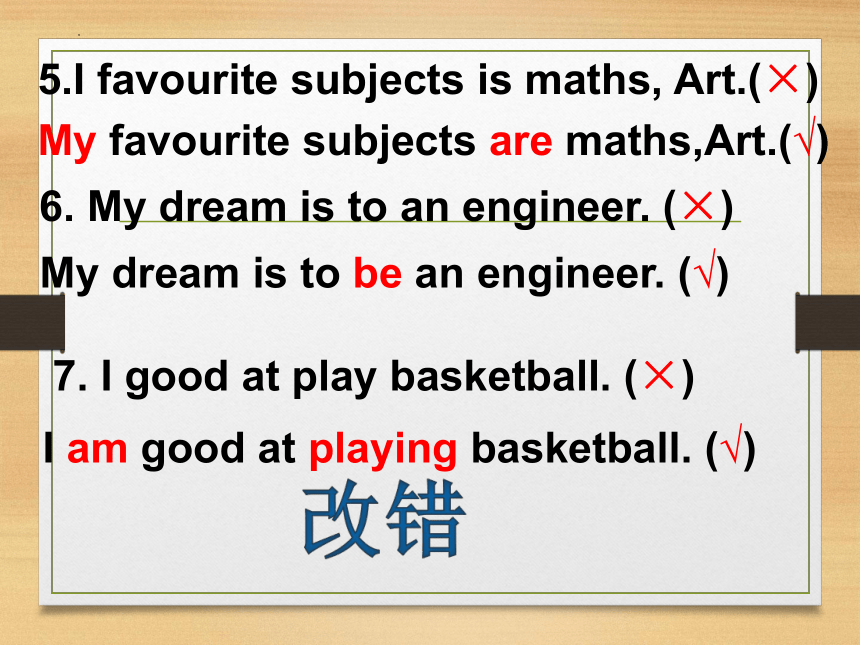
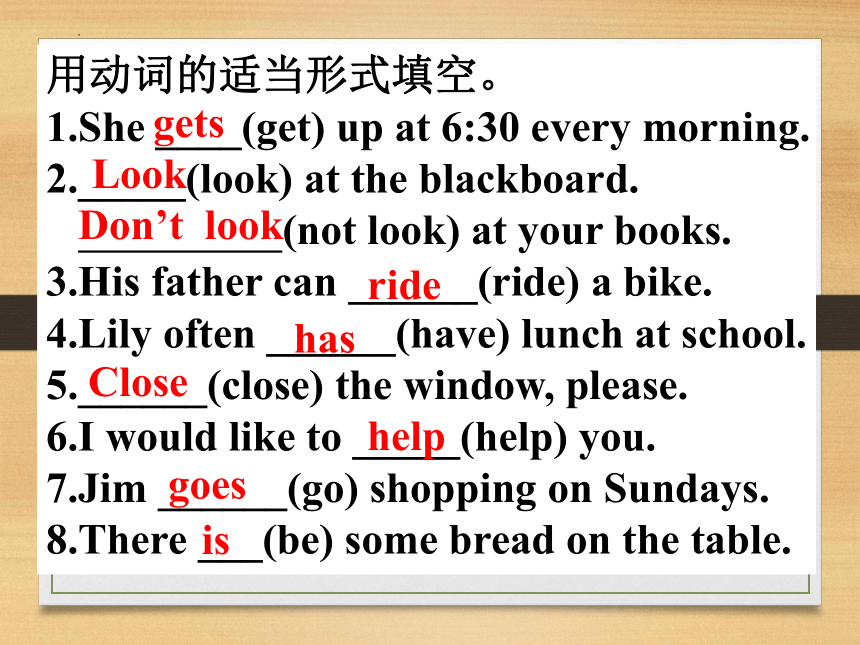
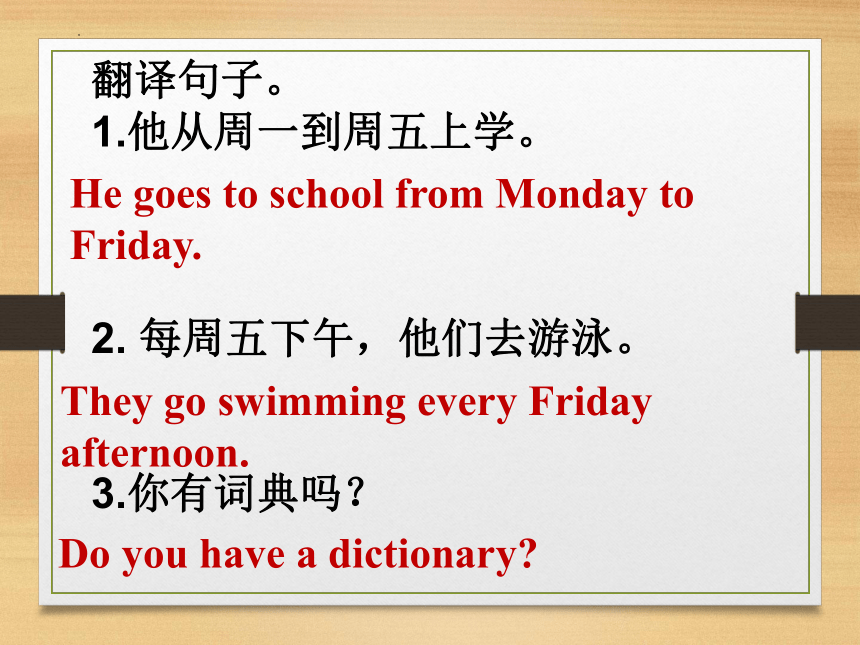

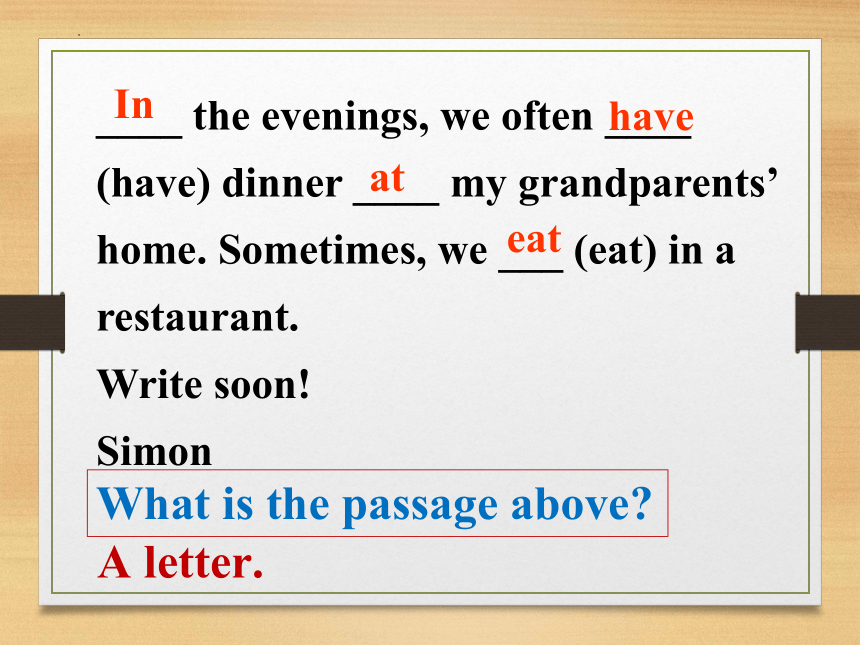
文档简介
(共36张PPT)
It is snowing hard/heavily.
There is heavy snow.
请对下列各句的划线部分提问, 每空一词。
I watch TV every night. _____ do you do every night
_____ _____ ____ you watch TV
2. I like the red one best.
______ one do you like best
What
Which
Let’s do some exercises!
How often do
3. Millie’s bike is in the playground. ______ bike is in the playground
4. We’ll meet at the school gate at 4:30 pm.
_____ and ______ shall we meet
5. I’m late for school because I get up late.
____ are you late for school
Whose
When
Where
Why
6. Jenny goes to New York by train.
____ does Jenny go to New York
7. Miss Yang is our English teacher.
___ is your English teacher
8. I am 14 years old.
_______________ are you
How
Who
How old
9. There are 48 students in our class.
__________ students are there in
your class
10. The red dress is 50 yuan.
_________ is the red dress
How many
How much
____ W ____X _____L ____ E
____S ____U _____R ____N
____A ____H _____F ____I
___umbrella _____ useful book
___unhappy girl ____hour
___ice-cream ___one-year-old boy
___800-metre race ___ actor
___European ____ university
___ honest man ____uniform
a
an
an
an
an
a
an
an
an
an
an
an
an
a
an
an
an
a
an
an
a
a
an
a
不定冠词填空
1. I
am come
from China.(×)
I am from China./ I come from China.(√)
2. I have long hairs. (×)
I have long hair. (√)
3. I have elder sister. (×)
I have an elder sister. (√)
4. I go to school by a school bus. (×)
I go to school by school bus. (√)
改错
5.I favourite subjects is maths, Art.(×)
My favourite subjects are maths,Art.(√)
6. My dream is to an engineer. (×)
My dream is to be an engineer. (√)
7. I good at play basketball. (×)
I am good at playing basketball. (√)
改错
用动词的适当形式填空。
1.She ____(get) up at 6:30 every morning.
2._____(look) at the blackboard.
(not look) at your books.
3.His father can ______(ride) a bike.
4.Lily often ______(have) lunch at school.
5.______(close) the window, please.
6.I would like to _____(help) you.
7.Jim ______(go) shopping on Sundays.
8.There ___(be) some bread on the table.
gets
Look
Don’t look
ride
has
Close
help
goes
is
翻译句子。
1.他从周一到周五上学。
2. 每周五下午,他们去游泳。
3.你有词典吗?
He goes to school from Monday to Friday.
They go swimming every Friday afternoon.
Do you have a dictionary
Dear David,
__ the weekend, I usually __ (go) running ___ half and hour. Then I ____ (play) football. My mother ____________ (not watch) our games but my father _______ (watch) them. I ___ (be) good at football. ___ (be) you good at football Sometimes my mother ___ (fly) a kite ____ me in the park.
go
play
doesn’t watch
watches
am
Are
flies
At
for
with
____ the evenings, we often ____ (have) dinner ____ my grandparents’ home. Sometimes, we ___ (eat) in a restaurant.
Write soon!
Simon
have
eat
In
at
What is the passage above
A letter.
My mother
My mother is _________(老师). She _____
(teach) English. My mother________(起床)
___ 6 o’clock. She _____(做饭) breakfast ___ me and then ______(send)____(I) to school. We live ______________(离…远) _____(she) workplace, so she _____ (乘) a bus to school. My mother always helps me _______ my homework. She is often very tired. I thank _____(I) mother.
a teacher
teaches
gets up
at
cooks
sends
me
far away from
takes
do/with
for
her
my
1.My mother is a junior high school teacher.
My mother_____ ____ a junior high school.
2. She teaches English.
teaches in
She is _____ ______ _______.
an English teacher
3. She always arrives at school at 7:25 a.m.
She always ____ ____ school at 7:25 a.m.
She always ______ school at 7:25 a.m.
gets to
reaches
4. She sometimes helps me with my homework.
She sometimes helps me _____ my homework.
do
She helps me with my homework ____ _______.
at times
Enjoy English
【1】At the Lesson of Geography
A teacher put his finger on some place on the map and said:
“What is this, John ”
John got up and said: “Your forefinger.”
【2】Twenty-eight Days
Teacher: Now, Nick, tell me which month has twenty-eight days in it.
Nick(thinks a little and says): They all have.
Notice
Boys and girls:
Attention, please! I have some important to tell you. In order to celebrate the Youth Day, the Students’ Union of our school has decided to have an activity in South Lake on May 4. We’ll spend the whole day. In the morning, our chairman will give us a talk on the history of the May Fourth Movement. At noon, we will have a picnic. In the afternoon, each class will have a get-together. Please get ready. By the way, everyone should take part in the activity. We’ll start off from the South Lake at 8:30 a.m. May4.
That’s all. Thank you.
1.When will the activity start
2.Where will the class have the activity
3.What festival will they celebrate
4.How long will the activity last for(持续)
5.Who will take part in the activity
On May 4.
In South Lake.
The Youth Day.
(For) a (whole) day.
Everyone/All the students.
In China , the four seasons are all very beautiful.
Spring is from March to May. In spring , it’s sunny and warm. 1._____ The world is full of energy. Summer is from June to August . 2._____Summer is my favorite season, because I can eat ice-cream or enjoy swimming in the sea. Fall is from September to November, it’s always cool. 3._____The scene is very beautiful , and many people like to watch it. What is the last season Yes , it is winter. 4._____The wind is cold , and it’s always snowy in northern China. However, I can go skiing or play in the snow.
The four seasons in China is so lovely that I can’t say which one is better than the others.
A. The wind blows gently, and it makes leaves fall down .
B. It’s from December to February.
C. The animals who sleep in winter wake up, and flowers come out .
D. The weather’s sunny and hot.
C
D
A
B
Enjoy English
【3】The pen
Bill: Mary, give me your pen, please.
Mary: why don't you want to write with your own pen
Bill: Because it always makes so many mistakes.
【4】Anne's Age
Teacher: How old are you, Anne
Anne: Fifteen.
Teacher: But you were only seven last year, and now you are eight years old.
Anne: Well, seven last year and eight this year make fifteen.
( ) 1. My younger brother can read,____he can’t write.
A. so B. and C. for D. but
( ) 2. There ____ a glass of milk and two pieces of bread on the table.
A. is B. are C. has D. have
( ) 3. It’s time to have class. We must stop_______.
A. talk B. to talk C. talked D. talking
( ) 4. ---Let’s go swimming. --- _______.
Thank you. B. Sorry.
C. Good idea. D. How are you
( ) 5. ---____ do you go to visit your grandfather
--- Twice a year.
A. What time B. How many C. How D. How often
D
A
D
C
D
( ) 6. Could you give me _____ water
A. any B. some C. little D. many
( ) 7. --- Your new watch looks nice. --- ______.
Sure B. You are right
C. Thank you D. That’s OK
( ) 8. There is ___“u” and ___ “s” in the word “bus”.
A. an; a B. an; an C. a; an D. a; a
( ) 9. What ____ your school life _____
A. does; like B. do; like C. is; like D. is; likes
( ) 10. I think American English is a little _______ British English.
A. different from B. difference from
C. difference in D. different with
B
C
C
C
A
( ) 11. There are ___ women teachers in our school.
A. few B. a few C. a little D. little
( ) 12. There are no buses, ____ you’ll have to walk.
A. so B. or C. but D. for
( ) 13. My brother likes ______ coins.
collect B. collection C. collector D. collecting
( ) 14. They got much _____ from the Internet.
A. ideas B. photos C. information D. stories
( ) 15. --- Do you _____ most of your time doing the housework --- Yes, I do.
A. take B. cost C. spend D. pay
C
A
D
C
C
( ) 16. --- I will go to Sanya for the summer holiday.
--- ______!
Have a good time B. Well done
C. Best wishes to you. D. Thanks a lot
( ) 17. __something wrong with my bike. Can I use yours
A. It is B. It was C. There is D. There was
( ) 18. --- Would you like to go to the hospital to help sick kids this Sunday --- ________. I’ll be free then.
A. Sorry, I can’t B. Not at all
C. Thank you D. Sure, I’d love to.
( ) 19. --- ____ is her daughter
--- The girl on the right wearing blue jeans.
A. Who B. What C. Which D. Where
( ) 20. --- Shall we go out together
--- OK. What about ____ a movie
A. to see B. seeing C. see D. sees
A
C
D
C
B
My name is Jam. I’m from _______(German). My hobby is _______(surf) the Internet. I have been doing this for about three ______(year). I have ______(I) own computer at home. I like _______(send) e-mails, enjoy music and chat with _______(other) on the Internet. Sometimes I also play a few computer ______(game). Surfing the Internet _______(have) a lot of fun and at the same time I can______(get) lots of information. I hope I can become a computer ________(program) in the future.
Germany
surfing
years
my
to send
others
games
has
get
programmer
We love our teacher
The man in this photo is Eckart Loewe.___1___. He comes from Germany. Ten years ago, he went to Guangxi and became a volunteer (志愿者) teacher in the countryside.__2___.
Loewe teaches for free (免费).___3____. Loewe never uses textbooks in class. He doesn’t like to tell students how to do things. He just asks, “What do you want to do ” The children love Loewe very much. They like to hug (拥抱) him. ____4____.
A. They even climb up his back.
B. Today, he is still there
C. He uses a new way to teach students
D. He is 42 years old
D
B
C
A
用所给词的适当形式填空
1.Can you tell me about your _____ (day)life
2.What do you _____(usual)do on your weekend
3.I brush my _____(tooth)twice a day.
4.--What do students say _____ _____(often)in school, Lo
--I don't know, Hi.
5.In this unit, you will learn about people's daily _____(life). 6.Afternoon _____ end at 3:30 p.m.(class)
7.Sam always _____ to school on foot.(go)
8.Do you love _____ part in the school band practice (take)
9.My friends and I study in different _____ .(school)
10. Jim spends an hour ________(do) his homework.
daily
usually
teeth
most often
lives
classes
goes
taking
schools
doing
In junior high school or middle school in America,kids study English writing, Math, Science, Biology, Music and Art.
At 12 o'clock the students eat lunch at school. They have meat, vegetables, fruit, bread and a drink, but they like hot dogs and hamburgers best. American children like sugar, and after the meal they can have a small piece of cake.
Students sleep for a short time after lunch. They begin classes at 3 o'clock. They go to school on weekdays and have classes for six hours every day and then return home.
Parents let kids play or watch TV until supper at 6:00 pm. After supper, they do their homework. Sometimes children and their parents have a family activity after dinner.
( )1.How many subjects do kids in America study
A.5 B. 6 C. 7 D. 8
( )2.Where do students eat lunch?
A.at school B. at home C. at 12 o'clock D. in the classroom
( )3.What food do American students like best?
A. vegetables fruit bread B. a small piece of cake C. Sugar D. hot dogs and hamburgers
( )4.How many hours of classes do American students have in a week
A. 6 B.30 C. 42 D. 12
B
A
D
B
用所给词的适当形式填空
1.My mother______(have) a lot of cousins.
2.Many people often _______ (listen) to the radio in the morning.
3.______(do)she _______(like) playing the violin
4.We __________(not watch) TV on Monday.
5.Sandy usually ______(play) the piano on Sundays
6.The cat______(like) eating fish very much.
7.Fang Fang often plays basketball with _____(friend).
8.My uncle does sports ____ a week.(two)
9.He usually helps me ________( learn) English.
10.My mother is a teacher, and she teaches ________(China).
11.After dinner, she prepares _______(she) lessons at home.
12.Jason is talking about his _________ daily life. (mother)
has
listen
Does
like
don’t watch
plays
likes
friends
twice
(to) learn
Chinese
her
mother’s
13.It’s a __________ ( sun ) day today.
14.It’s hard to walk on __________ ( mud )roads.
15.The wind is blowing ________ ( strong ) now.
16. Miss Li has a ___________ ( fun ) dog.
17.Look! The children are __________( love ).
18.The road is wet and ___________ ( ice ).
19.What a __________ rain! It’s raining _________. ( heavy)
20. What about ______(go) out to play
sunny
muddy
strongly
funny
lovely
heavy
heavily
going
( )1.It’s important for us ________English well.
A. learn B. learning C. to learn D. learnt
( )2.Forests ________both homes and food ________ animals.
A. protect, to B. protect , for C. provide , with D. provide , for
( )3.The students must __________when the teachers come in.
A.to stop talking B. stop to talk C.to stop to talk D. stop talking
( )4.Waste in the river causes a lot of _________, and ________ the river.
A. polllute, pollution B. pollution , pollutes
C. pollutions, pollute D. polllute, pollutions
( )5.A balloon can _________ people _________ in the sky.
A. lift ,up B. lift, on C. carry, up D. carry , on
( )6.Air __________ smell or taste.
A. have no B. has no C. have not D.has not
( )7.Air pollution ________traffic and factories.
A.come from B.comes from C.come to D. comes to
C
D
D
B
A
B
B
介词填空:
1.In the UK, their summer time starts ___the last Sunday in March.
2.In the UK, summer begins ______June.
3. Mary will get married _______ Monday morning.
4. It’s comfortable ______live ______ the south-east of China.
5. In Shanghai, thousands______ people take part in the spring marathon.
6. In autumn, leaves start falling ______the trees.
7. I would like ____be your e-friend.
8. If we want to write an email _____our e-friend, we should learn how to write addresses ____ English.
9. The class meeting will last______ about 50 minutes.
10. Here is a report ____protecting the Earth.
11. The land ______ earth is very large.
on
in
on
to
in
of
from
to
to
in
for
on
on
12. Mary often helps me _____ my English.
13. I am good ______ playing basketball.
14. I get up _____6 o’clock every day.
15. They always spend some time _____ the computer games.
16. It’s kind _____ you to help me.
with
at
at
on
of
日记;日记簿(n) diary 太空(n),空间=room space
宇宙飞船(n) spaceship 宇航服;航天服(n) spacesuit
紧张的(adj) nervous 离开(v) leave
重力;地球引力(n) gravity 能;能够(adj) able
漂浮;浮动(v) float 系;捆;绑(v) tie
我们自己(pron) ourselves 没有;缺乏(prep) without
虚弱的;无力的(adj) weak 呼吸(v) breathe
如果(conj),是否 if 照相机(n) camera
运转;运行(v);工作 work 花园(n) garden
岩石(n) rock 明信片(n) postcard
机器(n) machine 返回(v),还回 return
短语
多于 more than 能够 (be) able to
不得不;必须 have to 以便 so that
拍照 take photos 像……一样;如同 as adj./adv.as…
也就是说;即 that is 例如 such as
be nervous about
be/go away
ability n. unable adj. disabled n. adj.
away
…to… tying
untie
don’t/doesn’t have
unhealthy/ill
strong/ be weak in
breath n.
man
go(come)/give back
over/past
less than 少于
can
be unable to/can’t/fail to 不能
must
don’t have to=needn’t不必
in order that
as possible
like
for example
be poor/bad at…
It is snowing hard/heavily.
There is heavy snow.
请对下列各句的划线部分提问, 每空一词。
I watch TV every night. _____ do you do every night
_____ _____ ____ you watch TV
2. I like the red one best.
______ one do you like best
What
Which
Let’s do some exercises!
How often do
3. Millie’s bike is in the playground. ______ bike is in the playground
4. We’ll meet at the school gate at 4:30 pm.
_____ and ______ shall we meet
5. I’m late for school because I get up late.
____ are you late for school
Whose
When
Where
Why
6. Jenny goes to New York by train.
____ does Jenny go to New York
7. Miss Yang is our English teacher.
___ is your English teacher
8. I am 14 years old.
_______________ are you
How
Who
How old
9. There are 48 students in our class.
__________ students are there in
your class
10. The red dress is 50 yuan.
_________ is the red dress
How many
How much
____ W ____X _____L ____ E
____S ____U _____R ____N
____A ____H _____F ____I
___umbrella _____ useful book
___unhappy girl ____hour
___ice-cream ___one-year-old boy
___800-metre race ___ actor
___European ____ university
___ honest man ____uniform
a
an
an
an
an
a
an
an
an
an
an
an
an
a
an
an
an
a
an
an
a
a
an
a
不定冠词填空
1. I
am come
from China.(×)
I am from China./ I come from China.(√)
2. I have long hairs. (×)
I have long hair. (√)
3. I have elder sister. (×)
I have an elder sister. (√)
4. I go to school by a school bus. (×)
I go to school by school bus. (√)
改错
5.I favourite subjects is maths, Art.(×)
My favourite subjects are maths,Art.(√)
6. My dream is to an engineer. (×)
My dream is to be an engineer. (√)
7. I good at play basketball. (×)
I am good at playing basketball. (√)
改错
用动词的适当形式填空。
1.She ____(get) up at 6:30 every morning.
2._____(look) at the blackboard.
(not look) at your books.
3.His father can ______(ride) a bike.
4.Lily often ______(have) lunch at school.
5.______(close) the window, please.
6.I would like to _____(help) you.
7.Jim ______(go) shopping on Sundays.
8.There ___(be) some bread on the table.
gets
Look
Don’t look
ride
has
Close
help
goes
is
翻译句子。
1.他从周一到周五上学。
2. 每周五下午,他们去游泳。
3.你有词典吗?
He goes to school from Monday to Friday.
They go swimming every Friday afternoon.
Do you have a dictionary
Dear David,
__ the weekend, I usually __ (go) running ___ half and hour. Then I ____ (play) football. My mother ____________ (not watch) our games but my father _______ (watch) them. I ___ (be) good at football. ___ (be) you good at football Sometimes my mother ___ (fly) a kite ____ me in the park.
go
play
doesn’t watch
watches
am
Are
flies
At
for
with
____ the evenings, we often ____ (have) dinner ____ my grandparents’ home. Sometimes, we ___ (eat) in a restaurant.
Write soon!
Simon
have
eat
In
at
What is the passage above
A letter.
My mother
My mother is _________(老师). She _____
(teach) English. My mother________(起床)
___ 6 o’clock. She _____(做饭) breakfast ___ me and then ______(send)____(I) to school. We live ______________(离…远) _____(she) workplace, so she _____ (乘) a bus to school. My mother always helps me _______ my homework. She is often very tired. I thank _____(I) mother.
a teacher
teaches
gets up
at
cooks
sends
me
far away from
takes
do/with
for
her
my
1.My mother is a junior high school teacher.
My mother_____ ____ a junior high school.
2. She teaches English.
teaches in
She is _____ ______ _______.
an English teacher
3. She always arrives at school at 7:25 a.m.
She always ____ ____ school at 7:25 a.m.
She always ______ school at 7:25 a.m.
gets to
reaches
4. She sometimes helps me with my homework.
She sometimes helps me _____ my homework.
do
She helps me with my homework ____ _______.
at times
Enjoy English
【1】At the Lesson of Geography
A teacher put his finger on some place on the map and said:
“What is this, John ”
John got up and said: “Your forefinger.”
【2】Twenty-eight Days
Teacher: Now, Nick, tell me which month has twenty-eight days in it.
Nick(thinks a little and says): They all have.
Notice
Boys and girls:
Attention, please! I have some important to tell you. In order to celebrate the Youth Day, the Students’ Union of our school has decided to have an activity in South Lake on May 4. We’ll spend the whole day. In the morning, our chairman will give us a talk on the history of the May Fourth Movement. At noon, we will have a picnic. In the afternoon, each class will have a get-together. Please get ready. By the way, everyone should take part in the activity. We’ll start off from the South Lake at 8:30 a.m. May4.
That’s all. Thank you.
1.When will the activity start
2.Where will the class have the activity
3.What festival will they celebrate
4.How long will the activity last for(持续)
5.Who will take part in the activity
On May 4.
In South Lake.
The Youth Day.
(For) a (whole) day.
Everyone/All the students.
In China , the four seasons are all very beautiful.
Spring is from March to May. In spring , it’s sunny and warm. 1._____ The world is full of energy. Summer is from June to August . 2._____Summer is my favorite season, because I can eat ice-cream or enjoy swimming in the sea. Fall is from September to November, it’s always cool. 3._____The scene is very beautiful , and many people like to watch it. What is the last season Yes , it is winter. 4._____The wind is cold , and it’s always snowy in northern China. However, I can go skiing or play in the snow.
The four seasons in China is so lovely that I can’t say which one is better than the others.
A. The wind blows gently, and it makes leaves fall down .
B. It’s from December to February.
C. The animals who sleep in winter wake up, and flowers come out .
D. The weather’s sunny and hot.
C
D
A
B
Enjoy English
【3】The pen
Bill: Mary, give me your pen, please.
Mary: why don't you want to write with your own pen
Bill: Because it always makes so many mistakes.
【4】Anne's Age
Teacher: How old are you, Anne
Anne: Fifteen.
Teacher: But you were only seven last year, and now you are eight years old.
Anne: Well, seven last year and eight this year make fifteen.
( ) 1. My younger brother can read,____he can’t write.
A. so B. and C. for D. but
( ) 2. There ____ a glass of milk and two pieces of bread on the table.
A. is B. are C. has D. have
( ) 3. It’s time to have class. We must stop_______.
A. talk B. to talk C. talked D. talking
( ) 4. ---Let’s go swimming. --- _______.
Thank you. B. Sorry.
C. Good idea. D. How are you
( ) 5. ---____ do you go to visit your grandfather
--- Twice a year.
A. What time B. How many C. How D. How often
D
A
D
C
D
( ) 6. Could you give me _____ water
A. any B. some C. little D. many
( ) 7. --- Your new watch looks nice. --- ______.
Sure B. You are right
C. Thank you D. That’s OK
( ) 8. There is ___“u” and ___ “s” in the word “bus”.
A. an; a B. an; an C. a; an D. a; a
( ) 9. What ____ your school life _____
A. does; like B. do; like C. is; like D. is; likes
( ) 10. I think American English is a little _______ British English.
A. different from B. difference from
C. difference in D. different with
B
C
C
C
A
( ) 11. There are ___ women teachers in our school.
A. few B. a few C. a little D. little
( ) 12. There are no buses, ____ you’ll have to walk.
A. so B. or C. but D. for
( ) 13. My brother likes ______ coins.
collect B. collection C. collector D. collecting
( ) 14. They got much _____ from the Internet.
A. ideas B. photos C. information D. stories
( ) 15. --- Do you _____ most of your time doing the housework --- Yes, I do.
A. take B. cost C. spend D. pay
C
A
D
C
C
( ) 16. --- I will go to Sanya for the summer holiday.
--- ______!
Have a good time B. Well done
C. Best wishes to you. D. Thanks a lot
( ) 17. __something wrong with my bike. Can I use yours
A. It is B. It was C. There is D. There was
( ) 18. --- Would you like to go to the hospital to help sick kids this Sunday --- ________. I’ll be free then.
A. Sorry, I can’t B. Not at all
C. Thank you D. Sure, I’d love to.
( ) 19. --- ____ is her daughter
--- The girl on the right wearing blue jeans.
A. Who B. What C. Which D. Where
( ) 20. --- Shall we go out together
--- OK. What about ____ a movie
A. to see B. seeing C. see D. sees
A
C
D
C
B
My name is Jam. I’m from _______(German). My hobby is _______(surf) the Internet. I have been doing this for about three ______(year). I have ______(I) own computer at home. I like _______(send) e-mails, enjoy music and chat with _______(other) on the Internet. Sometimes I also play a few computer ______(game). Surfing the Internet _______(have) a lot of fun and at the same time I can______(get) lots of information. I hope I can become a computer ________(program) in the future.
Germany
surfing
years
my
to send
others
games
has
get
programmer
We love our teacher
The man in this photo is Eckart Loewe.___1___. He comes from Germany. Ten years ago, he went to Guangxi and became a volunteer (志愿者) teacher in the countryside.__2___.
Loewe teaches for free (免费).___3____. Loewe never uses textbooks in class. He doesn’t like to tell students how to do things. He just asks, “What do you want to do ” The children love Loewe very much. They like to hug (拥抱) him. ____4____.
A. They even climb up his back.
B. Today, he is still there
C. He uses a new way to teach students
D. He is 42 years old
D
B
C
A
用所给词的适当形式填空
1.Can you tell me about your _____ (day)life
2.What do you _____(usual)do on your weekend
3.I brush my _____(tooth)twice a day.
4.--What do students say _____ _____(often)in school, Lo
--I don't know, Hi.
5.In this unit, you will learn about people's daily _____(life). 6.Afternoon _____ end at 3:30 p.m.(class)
7.Sam always _____ to school on foot.(go)
8.Do you love _____ part in the school band practice (take)
9.My friends and I study in different _____ .(school)
10. Jim spends an hour ________(do) his homework.
daily
usually
teeth
most often
lives
classes
goes
taking
schools
doing
In junior high school or middle school in America,kids study English writing, Math, Science, Biology, Music and Art.
At 12 o'clock the students eat lunch at school. They have meat, vegetables, fruit, bread and a drink, but they like hot dogs and hamburgers best. American children like sugar, and after the meal they can have a small piece of cake.
Students sleep for a short time after lunch. They begin classes at 3 o'clock. They go to school on weekdays and have classes for six hours every day and then return home.
Parents let kids play or watch TV until supper at 6:00 pm. After supper, they do their homework. Sometimes children and their parents have a family activity after dinner.
( )1.How many subjects do kids in America study
A.5 B. 6 C. 7 D. 8
( )2.Where do students eat lunch?
A.at school B. at home C. at 12 o'clock D. in the classroom
( )3.What food do American students like best?
A. vegetables fruit bread B. a small piece of cake C. Sugar D. hot dogs and hamburgers
( )4.How many hours of classes do American students have in a week
A. 6 B.30 C. 42 D. 12
B
A
D
B
用所给词的适当形式填空
1.My mother______(have) a lot of cousins.
2.Many people often _______ (listen) to the radio in the morning.
3.______(do)she _______(like) playing the violin
4.We __________(not watch) TV on Monday.
5.Sandy usually ______(play) the piano on Sundays
6.The cat______(like) eating fish very much.
7.Fang Fang often plays basketball with _____(friend).
8.My uncle does sports ____ a week.(two)
9.He usually helps me ________( learn) English.
10.My mother is a teacher, and she teaches ________(China).
11.After dinner, she prepares _______(she) lessons at home.
12.Jason is talking about his _________ daily life. (mother)
has
listen
Does
like
don’t watch
plays
likes
friends
twice
(to) learn
Chinese
her
mother’s
13.It’s a __________ ( sun ) day today.
14.It’s hard to walk on __________ ( mud )roads.
15.The wind is blowing ________ ( strong ) now.
16. Miss Li has a ___________ ( fun ) dog.
17.Look! The children are __________( love ).
18.The road is wet and ___________ ( ice ).
19.What a __________ rain! It’s raining _________. ( heavy)
20. What about ______(go) out to play
sunny
muddy
strongly
funny
lovely
heavy
heavily
going
( )1.It’s important for us ________English well.
A. learn B. learning C. to learn D. learnt
( )2.Forests ________both homes and food ________ animals.
A. protect, to B. protect , for C. provide , with D. provide , for
( )3.The students must __________when the teachers come in.
A.to stop talking B. stop to talk C.to stop to talk D. stop talking
( )4.Waste in the river causes a lot of _________, and ________ the river.
A. polllute, pollution B. pollution , pollutes
C. pollutions, pollute D. polllute, pollutions
( )5.A balloon can _________ people _________ in the sky.
A. lift ,up B. lift, on C. carry, up D. carry , on
( )6.Air __________ smell or taste.
A. have no B. has no C. have not D.has not
( )7.Air pollution ________traffic and factories.
A.come from B.comes from C.come to D. comes to
C
D
D
B
A
B
B
介词填空:
1.In the UK, their summer time starts ___the last Sunday in March.
2.In the UK, summer begins ______June.
3. Mary will get married _______ Monday morning.
4. It’s comfortable ______live ______ the south-east of China.
5. In Shanghai, thousands______ people take part in the spring marathon.
6. In autumn, leaves start falling ______the trees.
7. I would like ____be your e-friend.
8. If we want to write an email _____our e-friend, we should learn how to write addresses ____ English.
9. The class meeting will last______ about 50 minutes.
10. Here is a report ____protecting the Earth.
11. The land ______ earth is very large.
on
in
on
to
in
of
from
to
to
in
for
on
on
12. Mary often helps me _____ my English.
13. I am good ______ playing basketball.
14. I get up _____6 o’clock every day.
15. They always spend some time _____ the computer games.
16. It’s kind _____ you to help me.
with
at
at
on
of
日记;日记簿(n) diary 太空(n),空间=room space
宇宙飞船(n) spaceship 宇航服;航天服(n) spacesuit
紧张的(adj) nervous 离开(v) leave
重力;地球引力(n) gravity 能;能够(adj) able
漂浮;浮动(v) float 系;捆;绑(v) tie
我们自己(pron) ourselves 没有;缺乏(prep) without
虚弱的;无力的(adj) weak 呼吸(v) breathe
如果(conj),是否 if 照相机(n) camera
运转;运行(v);工作 work 花园(n) garden
岩石(n) rock 明信片(n) postcard
机器(n) machine 返回(v),还回 return
短语
多于 more than 能够 (be) able to
不得不;必须 have to 以便 so that
拍照 take photos 像……一样;如同 as adj./adv.as…
也就是说;即 that is 例如 such as
be nervous about
be/go away
ability n. unable adj. disabled n. adj.
away
…to… tying
untie
don’t/doesn’t have
unhealthy/ill
strong/ be weak in
breath n.
man
go(come)/give back
over/past
less than 少于
can
be unable to/can’t/fail to 不能
must
don’t have to=needn’t不必
in order that
as possible
like
for example
be poor/bad at…
